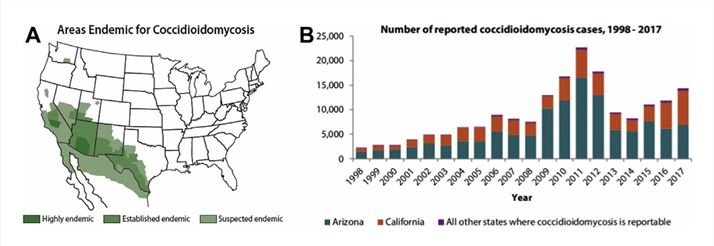Coccidioidomycosis
Coccidioidomycosis is a fungal infection found in the Western hemisphere. When there are symptoms, they usually come in the form of pneumonia. Very few of the infections become disseminated disease. Our company easily meets your needs in the development of drugs and therapies for Coccidioidomycosis therapy.
Introduction to Coccidioidomycosis
Coccidioidomycosis, or Valley Fever, is a fungal infection that follows the inhalation of spores from Coccidioides species, which are located in dry areas of the southwestern United States, like California and Arizona. The number of reported cases of coccidioidomycosis is on the rise, and California has reported a staggering 9,280 cases in 2023, which is more than any other year in this state. Coccidioidomycosis cases across the United States and its territories is on the rise due to a multitude of environmental factors including climate change which is the epitome of fungal growth.
 Fig. 1 Epidemiology of Coccidioides infection. (Krogstad, P., et al., 2019)
Fig. 1 Epidemiology of Coccidioides infection. (Krogstad, P., et al., 2019)Host-Pathogen Interactions in Coccidioidomycosis
Coccidioidomycosis host pathogen interactions, like other forms of pathogens, rely on very sophisticated mechanisms where both innate and adaptive immune mechanisms are crucial in the infection controlling. Influences in disease's evolution tend to be possible due to failure in sensing the fungi and inducing an immune response. The involvement of immune system Dectin-1, which is a pattern recognition receptor for fungi, has been elaborated on further.
 Fig. 2 Coccidioides biology. (Krogstad, P., et al., 2019)
Fig. 2 Coccidioides biology. (Krogstad, P., et al., 2019)Diagnosis Development of Coccidioidomycosis
The molecular methods for diagnosing coccidioidomycosis include PCR and real-time PCR, which are more sensitive and specific than other techniques. These approaches allow for a more economic diagnosis by decreasing the time necessary for accurately identifying the Coccidioides species. New developments in molecular point of care testing (POCT) give hope for enhancing availability and decreasing the lag time for diagnosis.
 Fig. 3 Timeline of the evolution of clinical laboratory for coccidioidomycosis detection. (Gastelum-Cano, J.M., et al., 2021)
Fig. 3 Timeline of the evolution of clinical laboratory for coccidioidomycosis detection. (Gastelum-Cano, J.M., et al., 2021)Vaccine Development of Coccidioidomycosis
| Type | Vaccine | Background | Mechanism | Development Stage |
|---|---|---|---|---|
| Whole cell vaccines (live-attenuated or killed cells) |
Killed spherules | Formalin-killed Coccidioides Immitis strain | Not defined | Phase III |
| Cps1 | Live C.immitis strain deleted of Cps1 | T cell response | Preclinical | |
| Recombinant vaccines | Antigen2 | Proline-rich antigen on cell surface,with CpG adjuvant | T cell response | Preclinical |
Our Services
Through working with clients, our company formulates and implements unique and efficient therapy approaches for Coccidioidomycosis. Alongside providing development assistance, we also provide help tackling the major challenges in devising customized and effective solutions.
Platforms of Coccidioidomycosis Therapy Development
Animal Models of Coccidioidomycosis
We possess vast expertise in designing and maintaining animal models that accurately replicate the pathological and pharmacological aspects of Coccidioidomycosis. These models allow us to conduct a detailed assessment of safety and efficacy of the intended therapies, and much more.
| Non-Genetically Engineering Models | ||
|---|---|---|
| We provide an array of models designed to meet specific research requirements for Coccidioidomycosis. These models allow researchers to replicate and study the intricate biological processes associated with the disease. | ||
| Optional Models |
|
|
| Genetically Engineered Models | ||
| Our expertise in genetic engineering techniques, enables us to create precise and reliable models that replicate the genetic alterations seen in Coccidioidomycosis. | ||
| Optional Models |
|
|
| Optional Species | Mice, Rats, Non-human primates, Others | |
Apart from these, we also focus on other comprehensive services which target specific signaling pathways and molecular targets through animal models.
If you are interested in our services, please contact us as soon as possible for more information.
References
- Krogstad, P., et al., "Host-Pathogen Interactions in Coccidioidomycosis: Prognostic Clues and Opportunities for Novel Therapies." Clin Ther, (2019). 41(10): p. 1939-1954 e1931.
- Gastelum-Cano, J.M., et al., "The clinical laboratory evolution in coccidioidomycosis detection: Future perspectives." J Mycol Med, (2021). 31(3): p. 101159.
- Rivera, A., et al., "Harnessing the Immune Response to Fungal Pathogens for Vaccine Development." Annu Rev Microbiol, (2022). 76: p. 703-726.
All of our services and products are intended for preclinical research use only and cannot be used to diagnose, treat or manage patients.

